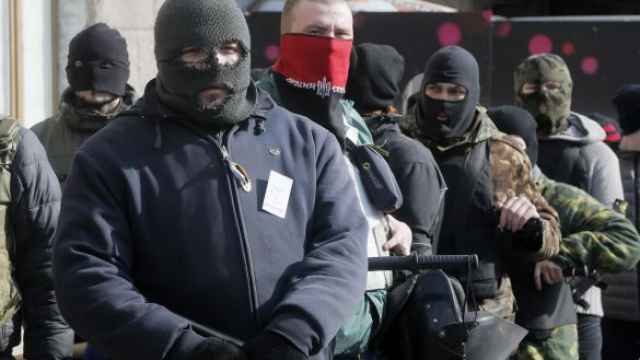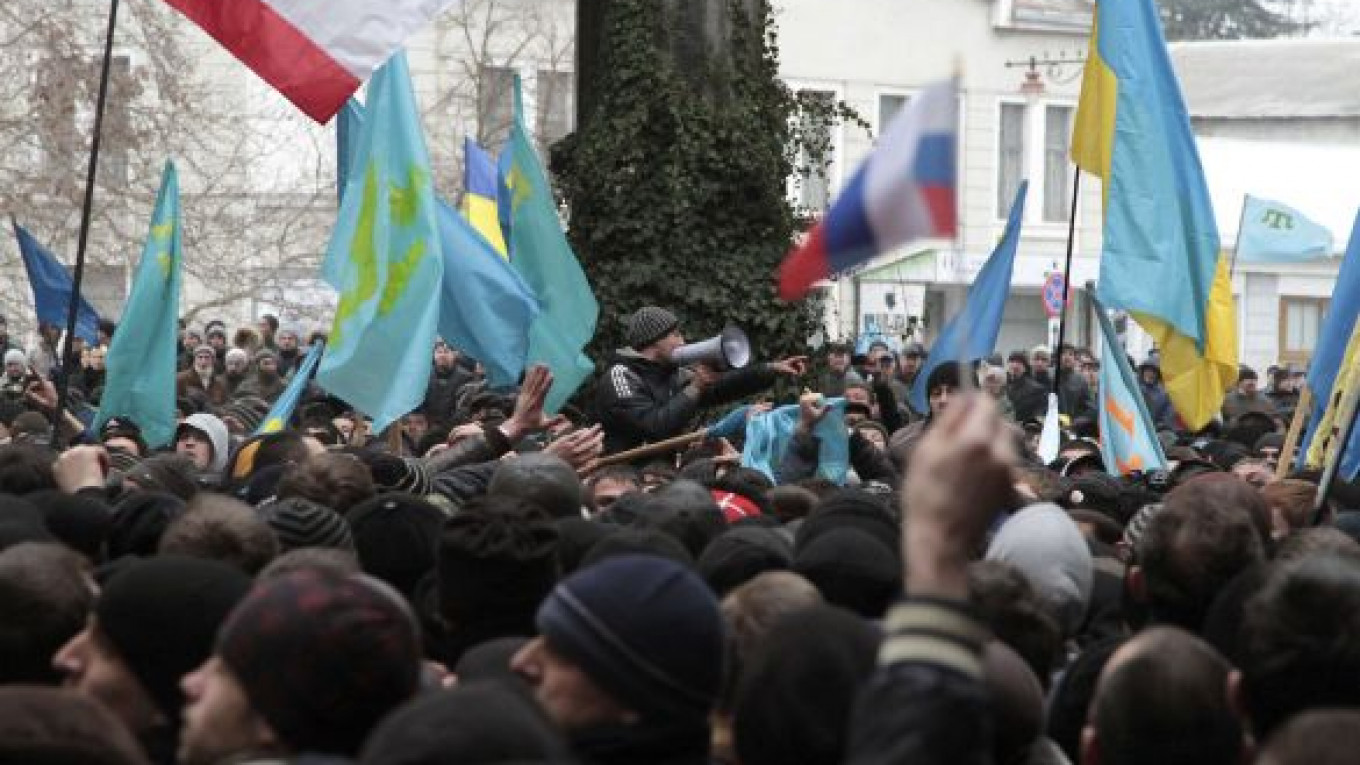President Vladimir Putin put Russian combat troops on high alert for war games near Ukraine on Wednesday, the Kremlin's most powerful gesture yet after days of saber-rattling since its ally Viktor Yanukovych was toppled as president in Kiev.
Moscow denounced what it described as the rise of "nationalist and neo-fascist sentiment" in Ukraine's mainly Ukrainian-speaking western areas, where it said Russian speakers were being deprived of rights. It has repeatedly expressed concern for the safety of Russian citizens in Ukraine.
"In accordance with an order from the president of the Russian Federation, forces of the Western Military District were put on alert at 14:00, [10:00 GMT] today," said Defense Minister Sergei Shoigu as saying, announcing a drill, interfax reported. The western district borders on Ukraine.
Shoigu also said Russia was "carefully watching what is happening in Crimea" and taking "measures to guarantee the safety of facilities, infrastructure and arsenals of the Black Sea Fleet," RIA Novosti reported.
Western governments have repeatedly urged Moscow not to intervene. Asked about the Russian army drill, British Defense Secretary Philip Hammond said London was watching any Russian military activity.
"We would urge all parties to allow the Ukrainian people to settle their internal differences and then to determine their own future without external interference."
Since Yanukovych's downfall on Saturday, all eyes have been on Putin, who ordered an invasion of neighboring Georgia in 2008 to protect two self-declared independent regions with many ethnic Russians and others holding Russian passports. Moscow recognized the regions as independent states, effectively seizing control of the territory from its neighbor.
Any military action in Ukraine, a country of 46 million people that has close ties with European powers and the U.S., would be far more serious — the closest the West and Russia have come to outright confrontation since the Cold War.
Ukraine's new leadership plans to name its new Cabinet on Wednesday, paving the way for urgent IMF talks to stave off financial meltdown now that Russia is all but certain to cut off a $15 billion financial lifeline it offered Yanukovych as the prize for turning his back on ties with the European Union in November.
The International Monetary Fund has said it is prepared to send a team of negotiators to Kiev, but a government must first be formed there and request the aid. U.S. Deputy Secretary of State William Burns, visiting Kiev, said American financial experts were already in the country looking for ways to help.
Yanukovych fled his luxurious palace on the outskirts of Kiev on Friday night after days of violence in which scores of his countrymen were killed, including demonstrators shot dead by police snipers from rooftops.

A self-defense unit conducting a patrol of Kiev's city center Wednesday.
A street leading to Independence Square where many were killed has been renamed "Avenue of the Glory of the Heavenly Hundred" for those slain. It is now covered with heaps of flowers and candles. Pictures of the dead are nailed to trees.
Ukraine has suffered an identity crisis throughout two decades of independence from the Soviet Union. With borders drawn by Bolshevik commissars, it is split between a largely Ukrainian-speaking west, including areas annexed by the Soviets from Austria and Poland, and eastern provinces where Russian is spoken, mainly Russian territory since the middle ages.
Although most ethnic Ukrainians in the east speak Russian as a first language, the only area where ethnic Russians predominate is? Crimea, which has frequently seen separatist tension at times of mistrust between Moscow and Kiev.
In Yanukovych's eastern home region of Donetsk, there was little sign of support for the fugitive leader. His portrait had been taken down at the Donetsk headquarters of his former ruling Party of the Regions, where its leader in the provincial parliament Nikolai Zagoruyko said Yanukovych was to blame for the killings while he was president.
"Of course he is guilty," he said without hesitation. "He was the president. The guilt for what happened lies with Yanukovych."
The new authorities must salvage the economy of a country near bankruptcy and heavily dependent on Russian gas.
Oleskander Turchynov, the parliament speaker who assumed the presidential duties after the assembly removed Yanukovych from power on Saturday, took the helm of the armed forces. He is expected to pick a Cabinet to be announced late? Wednesday to crowds on Independence Square, crucible of the revolt.
Turchynov is an ally of opposition leader Yulia Tymoshenko, who was freed from jail moments before parliament removed Yanukovych. Tymoshenko, a former prime minister, has said she does not want to return to the job, which could go to economist Arseny Yatsenyuk, who ran her party while she was jailed.
Retired heavyweight boxing champion Vitaly Klitschko, who has said he will run for president, may also be given a post.
Ukrainians were shocked by the lavish palace that Yanukovych abandoned, stocked with a private zoo, exotic birds, a floating restaurant built like a pirate ship and a private golf course.
Yanukovych's precise whereabouts are not known, although the government says it believes he is hiding in Crimea.
Parliament has voted to request he be tried at the International Criminal Court in The Hague over the deaths on the square. On Wednesday the new authorities disbanded the Berkut "Golden Eagle" riot police units blamed by the public for posting sharpshooters on rooftops who killed protesters.
The U.S. Treasury warned banks to be on the look-out for potentially suspicious transfers of assets by Yanukovych or members of his circle.
Ukraine's Soviet-era industry depends on cheap imports of Russian natural gas. It said on Wednesday it had reduced purchases in February, in part because of a mild winter.
A Message from The Moscow Times:
Dear readers,
We are facing unprecedented challenges. Russia's Prosecutor General's Office has designated The Moscow Times as an "undesirable" organization, criminalizing our work and putting our staff at risk of prosecution. This follows our earlier unjust labeling as a "foreign agent."
These actions are direct attempts to silence independent journalism in Russia. The authorities claim our work "discredits the decisions of the Russian leadership." We see things differently: we strive to provide accurate, unbiased reporting on Russia.
We, the journalists of The Moscow Times, refuse to be silenced. But to continue our work, we need your help.
Your support, no matter how small, makes a world of difference. If you can, please support us monthly starting from just $2. It's quick to set up, and every contribution makes a significant impact.
By supporting The Moscow Times, you're defending open, independent journalism in the face of repression. Thank you for standing with us.
Remind me later.


